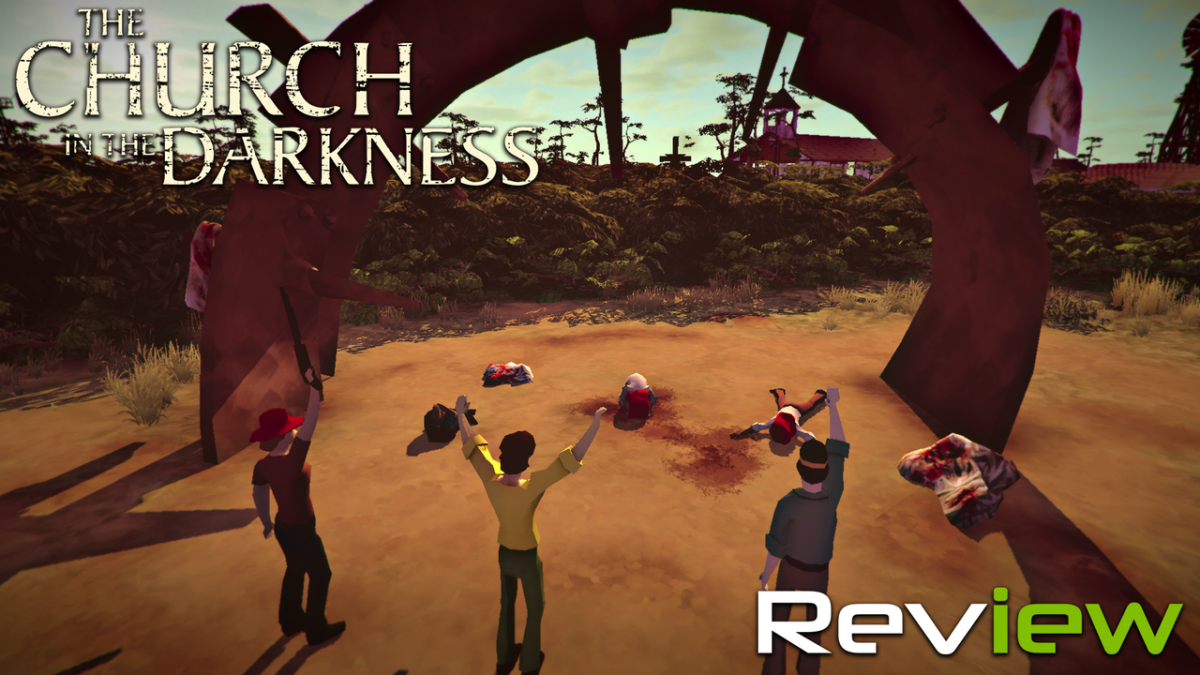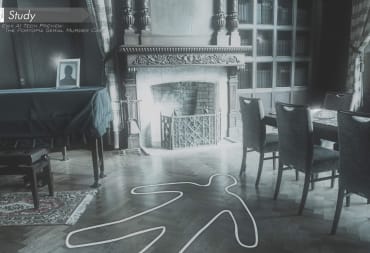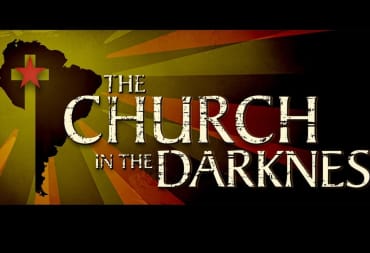I didn’t have fun playing The Church in the Darkness. That’s not to say that I don’t commend what it tries to do, or that moments of the game aren't worthwhile, but it wasn’t fun. I also don’t believe that the intent here was for players to have fun. The goal with this game is to send a message, to make a commentary. While I enjoy the title’s analysis on a myriad of topics including but not limited to capitalism, socialism, cults, and what it means to commit to something wholeheartedly, most of my feelings towards The Church in the Darkness involve frustration and annoyance.
Directed by Richard Rouse III, who has experience with titles like The Suffering, Quantum Break, and Sunset Overdrive, The Church in the Darkness sets you as Vic, a former law enforcement officer who’s sent to a socialist cult that was kicked out of the United States and relocated to South America during the 1970s. Vic’s mission? Find his nephew, Alex, and see how he’s doing. The kicker? Every time you play, he’ll be feeling a little different.
That’s right, each playthrough randomly generates, with each character having a different personality than before. This includes Alex, the cult leaders, and any friendlies you come across. Depending on who you interact with and how you do it, you can earn one of many different endings. While this sounds like the potential for a terrifying, unique, and thematic experience every time, the system doesn’t amount to much at all.
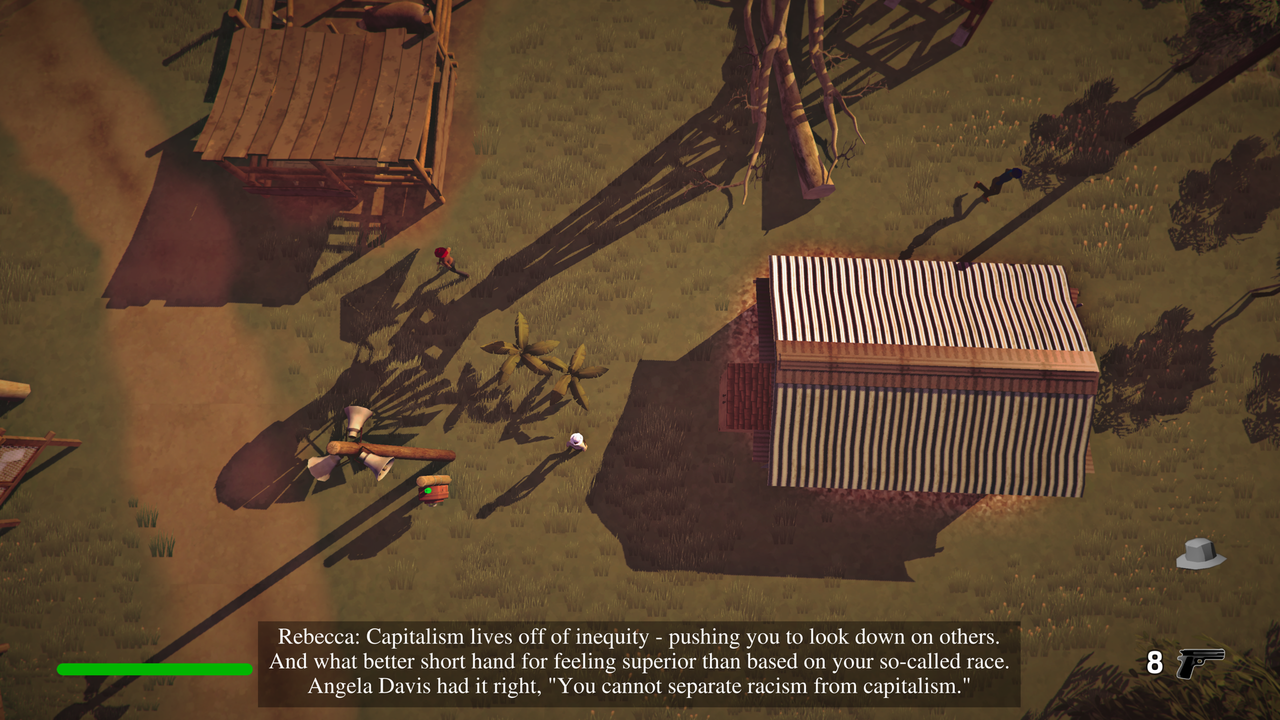
The Church in the Darkness' Branching Storylines
Let’s start with Alex. Sometimes, when you find him, he’ll be ready to leave. Scared of the cult leaders, he'll beg you to take him out of his hated existence. Other times, he’ll be so content in his space that he’ll try to convert you, asking you to speak to the leaders and change your mind. It’s fun to ponder Alex’s mood until you start to realize how little of an effect it has. From there, the rest of it starts to unravel.You see, it doesn’t matter if I take Alex back with me or leave him be. I could kill him, let someone shoot him, or even convert to the cult myself. I’ve done all of the above, looking for a drastic change in the way the narrative presents itself. I've found that very little changes in-game. Instead, you’ll see the fruits of your labor once you’ve either died, escaped, or found some other end state. Oh, and it’ll be through one or two short text excerpts and some accompanying images. That’s it. Next to no emotional satisfaction for reaching an ending. Each subsequent playthrough makes this more apparent.
The Church in the Darkness constantly makes note that its preachers have different personalities. It pushes you to get an ending with each variation, even giving you the option to start additional playthroughs with personalities you haven’t yet reached an ending yet. However, if the game hadn’t told me about these different personalities, I hardly would have noticed a difference.
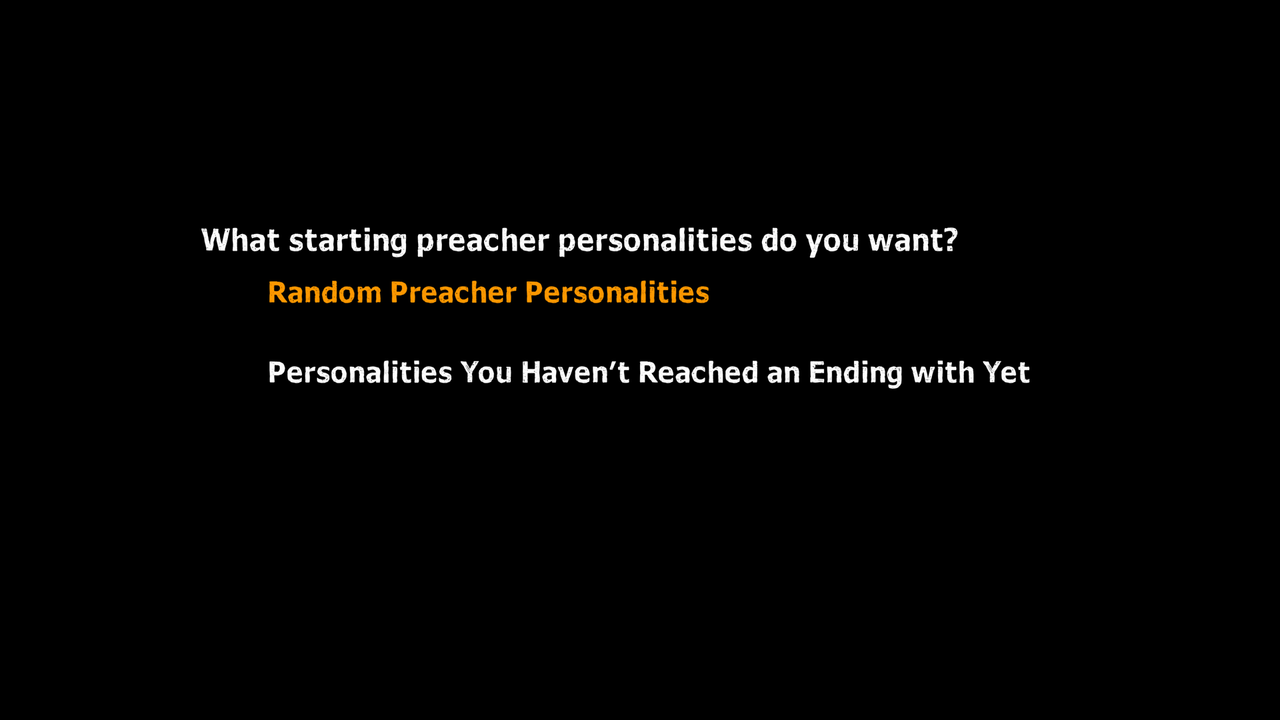
No matter what the world generates, you’re running through the cult with both Isaac and Rebecca shouting over intercoms, ranting about American capitalism, quoting famous leaders, and pushing their ideals. The voice acting here is fantastic, frankly, with Ellen McLain (GLaDOS from Portal) and John Patrick Lowrie (Sniper from Team Fortress 2) as the two cultists. However, despite a supposed personality change, the intercom speeches were about the same each time.
Actually speaking to the cult leaders was a little different. Rebecca either fumes about how I’m going to kill them all or begs me to just leave them all alone. However, as I've mentioned, there’s no weight to these changes. I would go to speak with her or Isaac, they would state their thoughts, and that would be it. I could then kill or subdue them. On the off chance that their personality is welcoming, they’ll offer to join the cult. Once done, the game ends I get some text telling me what happens, and it starts all over.
Interestingly, Isaac reminds me so much of Cave Johnson from Portal 2, voiced by J.K. Simmons, that there are times when I could hardly tell the two apart. Both of them rant confidently about their values with tones so certain that you have to be convinced, even if you don’t necessarily agree with the cult’s methods. There are times where I’d sit in a house, hidden, so I can focus on what’s being said.
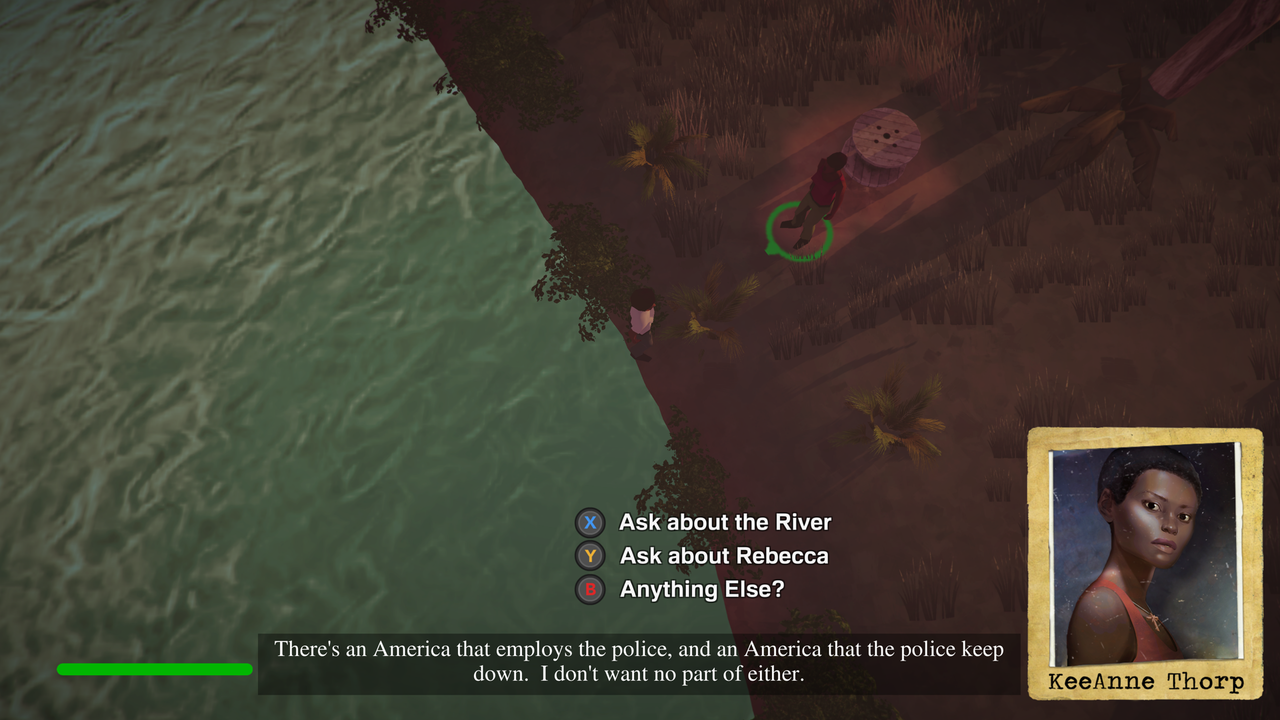
The Church in the Darkness' Powerful Statements
Nearly every line in the game is top-notch. There’s a letter with Alex asking his mom for extra money to fund the cult reads exactly like I did when I was a teenager, using whatever words I can to guilt them into funding my foolishness. Both Rebecca and Isaac consistently share their beliefs over the intercom, stating facts and sharing the influences that lead them to start this cult. Even better is how much you can learn about these characters from scattered documents around the environment.The social commentary here, claiming how the American Dream is really just a scam to make the rich richer, and that the poor will stay poor while the wealthy step all over them, is timely in our current political state. You can see why someone would follow Isaac and Rebecca, how these two can help a lost soul who isn’t making it in the free world feel at home. As with many cults, this one makes sure to prey on those who don’t have set ideals. Those who are looking for guidance and peace. While the writing is convincing and refreshing at first, you’ll tire of it quickly.
Each playthrough changes up the personalities, though it hardly alters the content. I’m super on board with Alex wanting to bail out of the cult, complaining about Isaac’s methods and motives the first time. However, when I’m on playthrough six, I want the kid to shut up and get a move on already. Frankly, these were my feelings for every character once I’ve gone through the game a couple of times. Depending on the difficulty and your path, an average run should take 25-45 minutes.
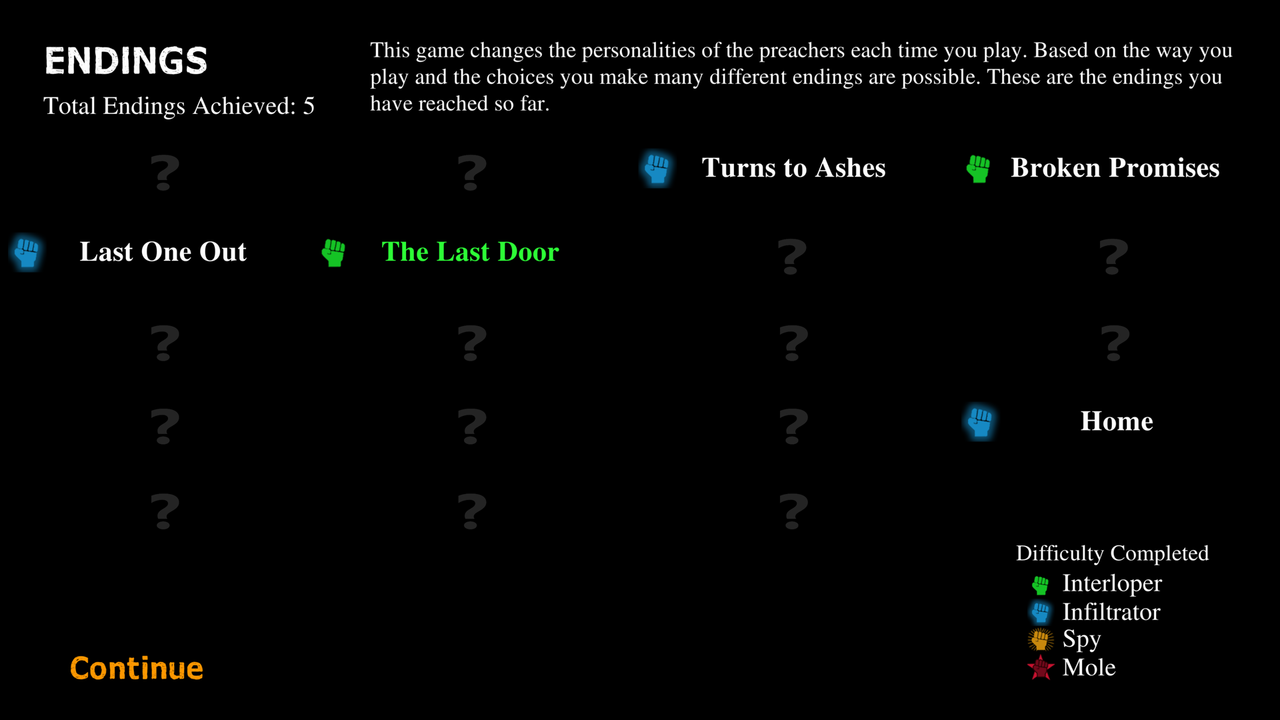
Each start is always the same. Vic enters via a hidden point, and you have to find clues to get to Alex. Once found, you can extract at that point either with or without him. That and there’s usually a marked friendly on your map who can point you in the right direction. Locations are always the same, just laid out differently each time. Your approach can be stealthy, violent, or anywhere in between.
The Church in the Darkness plays via a top-down perspective. Stealth players can sneak up and subdue or kill guards and civilians, while violent ones can run in guns blazing. If a guard or civilian sees you, there is a limited time frame to get out of their sight before they start firing and sound the alarm. If that happens, hide or disable the alarm with an item, and get back to your mission.
You have limited tools at your disposal initially. More items drop into the game after each ending. You can use chloroform to knock out enemies for longer, a sleep dart gun to hit them from afar, or an alarm clock to set a distraction and get around them that way. On lower difficulties, you can visualize others view cones at any time, ensuring that you stay out of their sight to make things a lot easier for yourself.
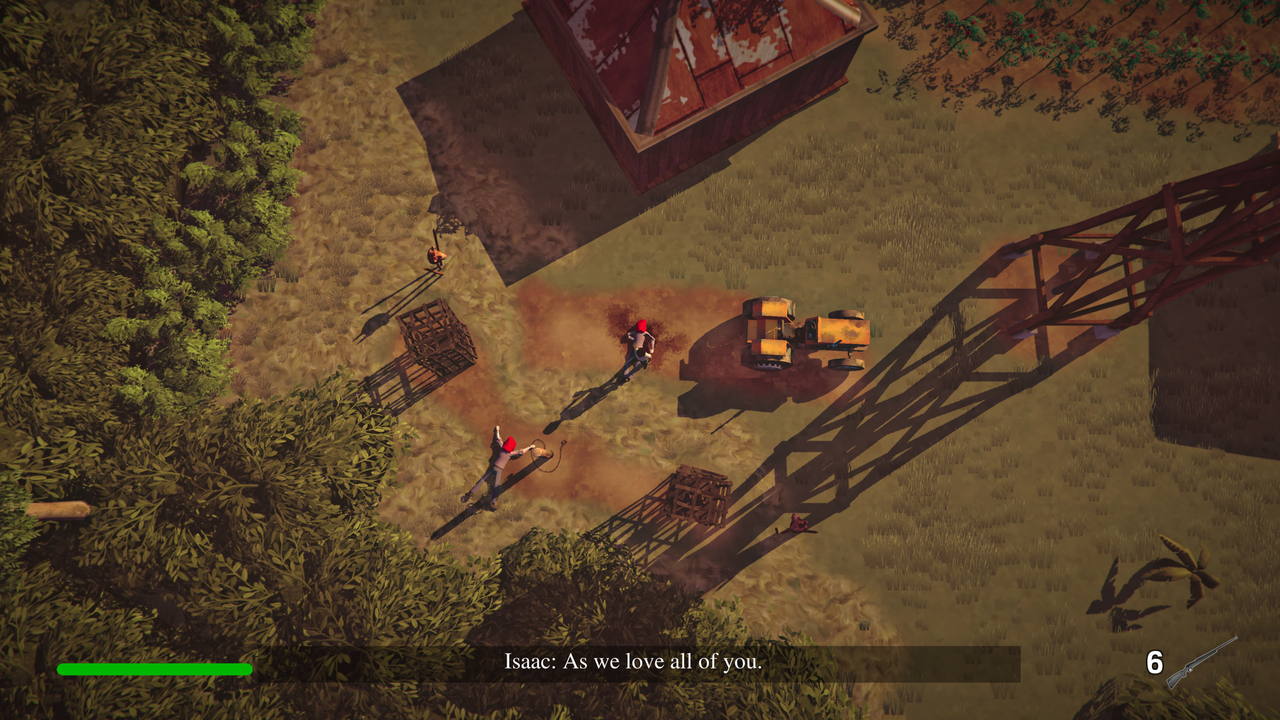
All things considered, the gameplay works fine. I occasionally missed a shot due to awkward aim assist. Maybe I accidentally threw a rock instead of hiding in a crate at one point. I end up dead in both instances since these actions draw unwanted attention. Each action has a slight delay to it. It's odd at first, but you eventually acclimate yourself. It kind of adds to the frantic experience that breaking into a cult should provide. Unfortunately, though, there’s no standout gameplay mechanic that justifies pushing through the same story beats over and over again to the point of frustration.
In fact, the more I played, the more I realize how shallow this branching narrative really is. To try and spice things up, I spoke to Alex. I found that he was super happy with the cult, and then went to see Rebecca and Isaac. I made a point to kill them, ran back to Alex to see his response and nothing was different. He didn’t yell at me or freak out. Instead, he had the same chat options as when I first spoke to him. When I finished that playthrough, The Chruch in the Darkness told me in its text excerpts about Alex's horrified reaction to Vic’s actions that day. That’s it. The path to each ending feels like one of the poorer side-quests in a Bethesda game. Only, there’s no epic main quest to return to here.
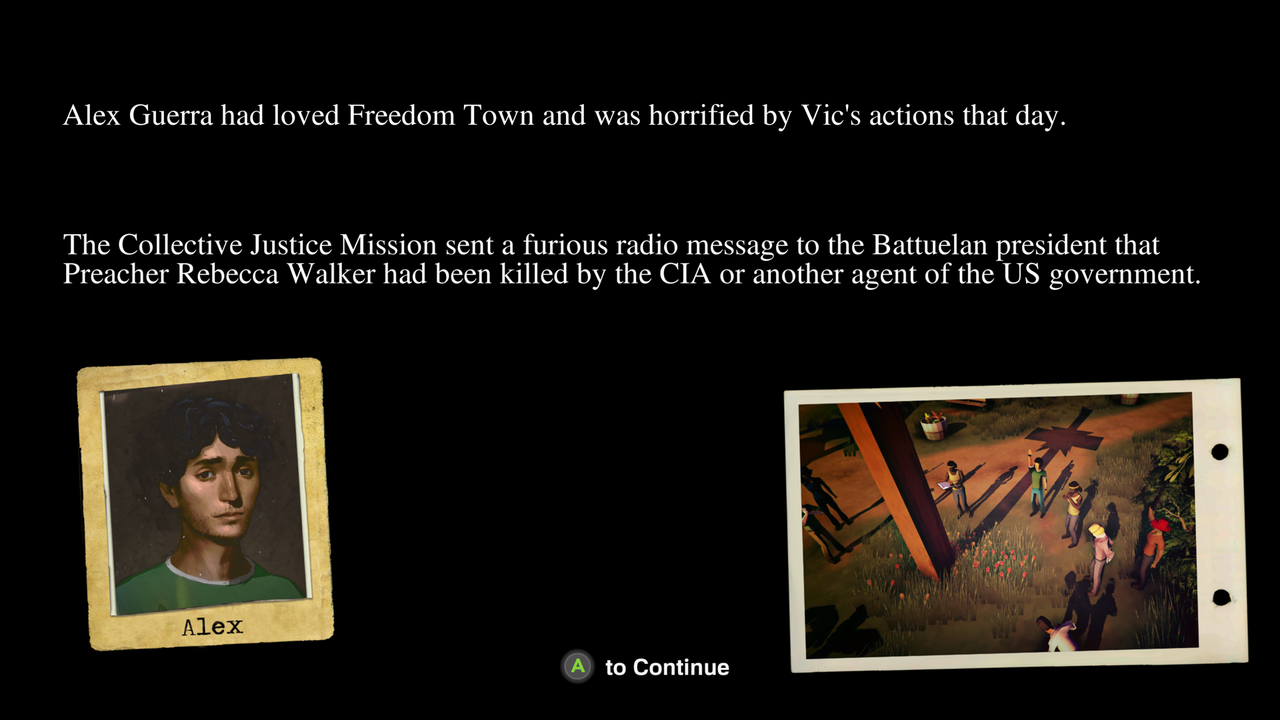
Random friendly characters unlock as you beat more endings, looking to vary the experience up a bit. However, that loses its charm after one playthrough considering that all side quests have you do the exact same thing. One character seeks out her kids after the cult sends them to Cuba. All she needs is their address. She says to look in the white chapels to find it. Great. Another character wants to find a photo of her long-dead husband. Guess where you find it? In the white chapels. Turns out, every side quest I’ve found in hours of play simply asks you to search the white chapels. There’s nothing special about these buildings either, no unique modifier or mini-game. They’re just another structure that sometimes has a guard in it.
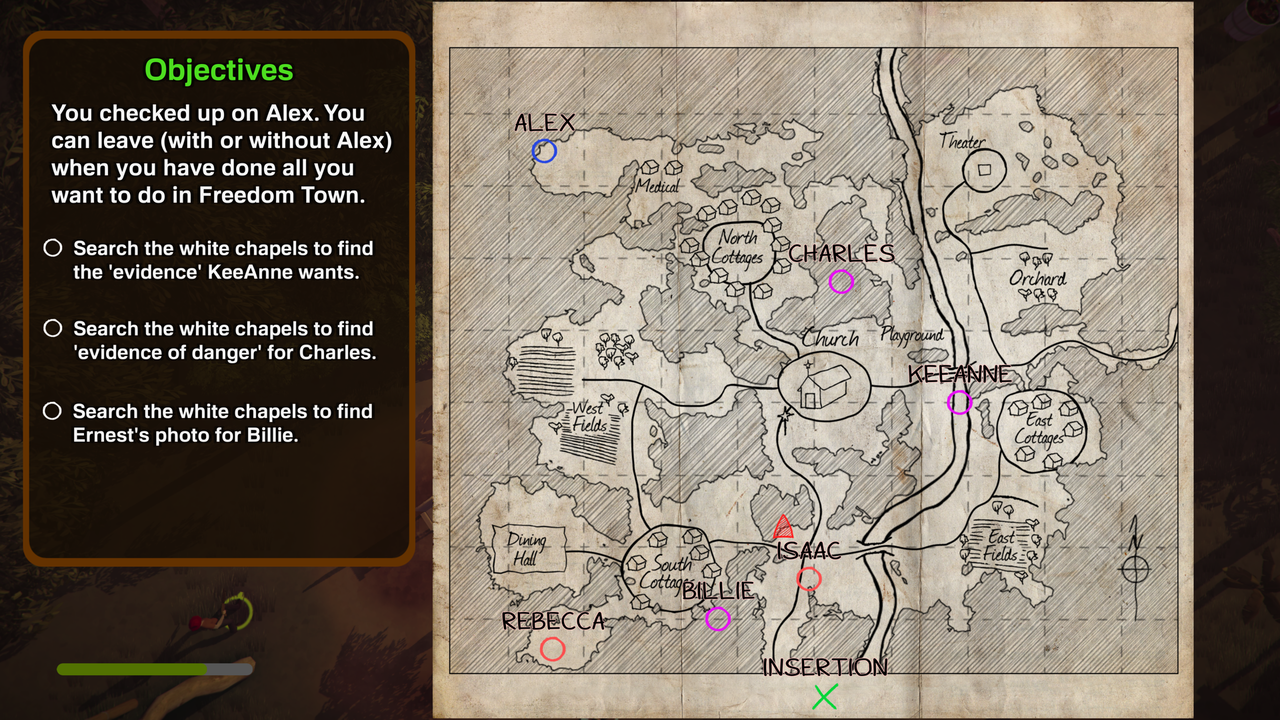
On top of this, each side character has the exact same lines, give or take an altered intro if you’ve alerted the guards or not by then. Also, you can’t skip them. So, every single time you want to start a side mission, you have to sit through lines and lines of text you’ve heard possibly dozens of times beforehand. There’s next to no payoff for completion either, with the person thanking you and you being on your way. They might get a mention in the end-game text, but nothing more.
The Church in the Darkness Review | An Unearned Emotional Ask
The Church In The Darkness’ core flaw is that it asks for emotional investment and response that it doesn’t earn. The game tells but doesn’t show. It sets up this interesting, fantastical narrative of a single-man cult invasion, doing your best to avoid being seen or swayed by its leader's convincing tales, although it doesn’t deliver any stakes in-game. I have pages more of notes and complaints that I haven’t even touched on here, like shoddy performance on my Xbox One X or black screen bugs or characters talking over one another. These would be redeemable if the game delivered on the narrative it promised. Yet it doesn’t, and that’s what matters here.I was ranting about the game to my girlfriend, frustrated that it doesn’t explore these topics better. After getting into its flaws, she had said: “this sounds like something that would be better as a movie.” Considering the fact that The Church in the Darkness mishandles any advantages that gaming brings to us as a medium, and the intended impact fails to be anything moving, I wholeheartedly agree. Maybe a focused, cinematic offering could have portrayed the message better.
TechRaptor reviewed The Church in the Darkness on Xbox One X via a code provided by the developer.
Review Summary
The Church in the Darkness is full of bold narrative topics, but the gameplay and presentation fail to match, making it quite difficult to experience the message.
(Review Policy)Pros
- Fantastic Writing
- Intriguing Commentary
- Top Of The Line Voice Acting
Cons
- Branching Narrative Is A Fluke
- Most Actions Are Inconsequential
- Gameplay Isn’t Anything Special
- Random Personalities Don’t Really Differ
Have a tip, or want to point out something we missed? Leave a Comment or e-mail us at tips@techraptor.net
